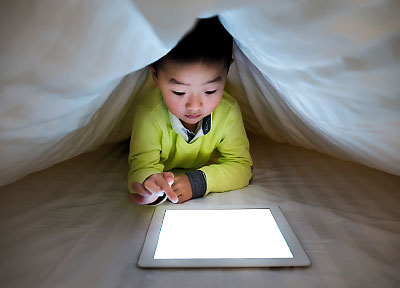Benefits, Detriments of Screen Time for Children Debated at AACAP
Abstract
Some experts argued that screen time can be a vital tool for keeping youth engaged and connected, especially during the pandemic, while others argued that screens can be addictive and potentially harmful.

For children and adolescents, is screen time a useful way to connect with peers and engage in learning, or is it habit forming and dangerous, prioritizing quick fixes and likes over deeper interpersonal relationships?
Six child and adolescent psychiatrists debated this question during the recent virtual meeting of the American Academy of Child and Adolescent Psychiatry (AACAP).
The topic of children and screen time has been much discussed within psychiatry for years, and the COVID-19 pandemic has only heightened concerns around the issue, as children and adolescents spend more time in front of screens for school, social connection, and entertainment.
The session started with a simple premise to which the audience was asked to agree or disagree: Screen time is good for children’s mental health. The moderator, Edwin Williamson, M.D., an assistant professor of psychiatry and behavioral sciences and the training director of the child and adolescent psychiatry fellowship program at Vanderbilt University, took the initial vote. Of about 170 people who voted, 28% agreed that screen time was good for mental health, while 72% said it was not.
Then, the two teams started their debate to see who could sway the most audience members to their side of the argument.
On the side opposing screen time, Shawn Sidhu, M.D., argued that screen time can be dangerous, and even life threatening, for youth. Sidhu is an associate professor in the Department of Psychiatry at the University of California, San Diego, and a member of APA’s Council on Children, Adolescents, and Their Families.
He noted that children can be exposed to sexual predators online, while teens especially can be bombarded with nearly constant cyberbullying, “to the point that they feel trapped with no way out, depressed, and suicidal,” he said. The opposing side also pointed out that some television shows can seriously impact kids’ mental health, such as Netflix’s “13 Reasons Why” (see Psychiatric News).
Sidhu was joined in his arguments by Kara Bagot, M.D., an assistant professor of psychiatry at the Icahn School of Medicine at Mount Sinai, who argued that too much screen time can have a detrimental impact on the developing brain.
“Screen-related overexposure appears to cause similar or identical brain changes to those that we see in addiction,” she said. “Screens are habit forming. They’re meant to be. They’re designed to increase the profit margins of corporations, not benefit our children.”
Her colleague, Paul Weigle, M.D., concurred. “All this screen time was not an accident. It did not come from nowhere, and it didn’t come for free,” he said. “It was engineered to serve the interests of Big Tech at the expense of the healthy child.” Weigle is the associate medical director of Natchaug Hospital Ambulatory Services at Hartford HealthCare.
On the opposing side, Stephen Schueller, Ph.D., invoked Plato in his argument in favor of screen time: “The arguments and the panic against technology are as old as technology itself,” said Schueller, an assistant professor of psychological science and informatics at the University of California, Irvine. “Plato spoke about the dangers of writing, in that if young people learned this new technology, it would corrode their memories and make it so they are no longer able to function.”
Schueller and M. Frampton Gwynette, M.D., noted that screen time can often be interactive and engaging. Gwynette said when his patients connect with their friends virtually, it strengthens those relationships, which is especially important during the COVID-19 pandemic. Screen time should, of course, be supervised to ensure safety, he noted, and anything can be used in excess, including screen devices. But without screens during the COVID-19 pandemic, this would be a lost year in which children couldn’t interact with friends and family or experience school. Gwynette is immediate past president of the South Carolina Psychiatric Association and an associate professor of psychiatry and behavioral sciences at the Medical University of South Carolina.
Finally, Rasim Somer Diler, M.D., an associate professor of psychiatry at the University of Pittsburgh, said screen time is a potentially great tool for diagnosis and patient monitoring. He works with children and adolescents with mood disorders, and using screens helps get the patients engaged when reporting their mood ratings. “Where would we be if we didn’t have the option of screen time?” he said, nodding to the fact that AACAP’s conference was being held virtually. “Where would our children be?”
Bagot noted during the debate that the real concern is about youth who use screens consistently. “We are not talking about kids who are video gaming one hour every other day,” she said. “We’re talking about kids who are engaging in any of these screen time activities a lot. … We know that any activity we do for many hours a day, every day of the week, is going to change our brains when we’re teenagers.”
During a session on how new media habits impact mental health, Marc N. Potenza, M.D., noted that online gaming has increased since the start of the pandemic, as has exposure to pornography. Pornhub, one of the largest pornography sites, reported an 11% increase in global traffic from February to March. Another article that Potenza and his colleagues published in Comprehensive Psychiatry noted that problematic internet use may increase during the pandemic and pointed to some recommendations to reduce the use of screens.
At the end of the debate, Williamson polled audience members again to see if they had been swayed to change their position on whether screen time is good for mental health. The audience had grown to about 270 people, but the responses were the same: 28% agreed, and 72% disagreed.
“I hope that lots of people went back and forth, because I went back and forth hearing the arguments,” Williamson said. ■



